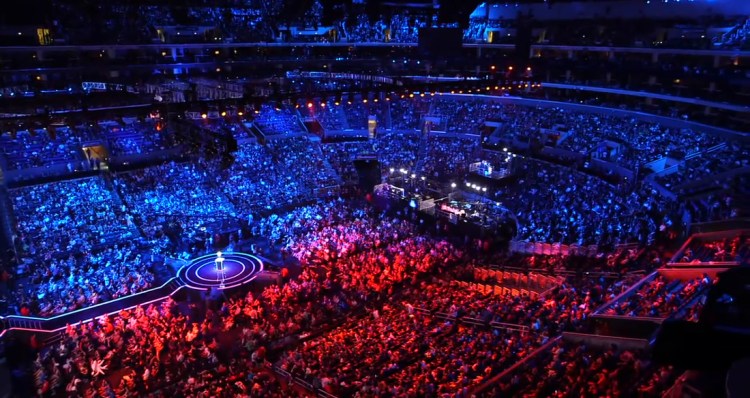When you think of college sports, you probably think of century-old programs like the University of Michigan playing Notre Dame in football. But the popularity of e-sports could soon change that perception, and League of Legends developer Riot Games is trying to help shape the future of collegiate gaming competitions.
Earlier this year, Riot revealed that it is partnering with multiple League of Legends clubs for the North American Collegiate Championships. The company is providing logistical support and money that goes into a scholarship fund for the winners. While many gamers who aspire to a life as a pro League player find this exciting, Riot admits that the future of collegiate e-sports is uncertain.
Riot Games manager of North American Programming Chris Wyatt told GamesBeat that fans and players aren’t sure what to make of League of Legends on the college level.
“Like us, it feels like players are still feeling out what the future of collegiate League of Legends play looks like,” he said.
Today, collegiate League of Legends looks like this: Hundreds of teams compete in four different regions that includes universities and colleges in the United States and Canada. Throughout the year, these different regions compete in qualifying events held by collegiate clubs including IvyLOL, CSL, TeSPA, and WellPlayed. The winners of those events go on to compete in the NACC and a piece of a $360,000 scholarship prize pool.
HBO’s Real Sports magazine show recently covered college League of Legends players and teams:
Bringing together games and education
While players are unsure, the college organizations that Riot is working with seem very happy about the partnership.
“It is awesome to work with Riot,” Collegiate Starleague chief executive officer Duran Parsnips told GamesBeat. “Especially from the standpoint of getting real support from a game developer.”
The CSL, which started in 2009 as an intercollegiate league for the Blizzard strategy game StarCraft, has always worked to bring together education and gaming. Parsnips says that it is amazing to work with a studio that cares about the same thing.
While Riot is now involved with organizations like CSL, Parsnips explains that not much has changed.
“The only difference is that rather than ending our season with one CSL champion, we’re seeding four teams into the next stage of the NACC,” he said.
The excitement to participate in a larger competition (and for $300,000 in scholarships) has helped these small leagues grow.
“[Our] reach has expanded exponentially due to Riot’s involvement,” said Parsnips. “The developer announcing the NACC on the main League of Legends webpage, and in the game itself, has opened the door for hundreds of new colleges that have never been involved in gaming before.”
Riot senses the enthusiasm that people like Parsnips have for this style of League of Legends competition.
“It’s exciting, since it feels like there’s a growing momentum behind everything [in the college game],” said Wyatt. “The fact that it’s uncharted territory makes it all the more alluring.”
The uncertain future
While Wyatt finds college e-sports alluring, his team hasn’t put a clear ten-year plan for the NACC into place.
“Everyone is still feeling this out,” he said. “[We’re] seeing where it would or could go.”
Of course, Riot Games is already busy with one of the biggest e-sports associations in the world. The company’s League Championship Series is a few years old now, and it awarded more than $2 million in prize money to the top teams at its championship event in South Korea earlier this year.
But Riot sees the college game as potentially offering something different but just as compelling to fans.
“Our theory is the collegiate competitive scene is a little different from e-sports,” said Wyatt. “The same way the Rose Bowl and the Super Bowl are both examples of high-level exciting competitive play, but with nuanced differences. Our goal is to be the facilitator, and support wherever player passion takes things.”
Riot provides support to the NACC. It ensures that each region and college organization uses the same rules to maintain consistency, and it investigates potential cases of fraud and violations.
Naturally, the company is also putting money into scholarship pool.
“To us, scholarships feel like a natural fit for collegiate competition prizing,” said Wyatt.
For now, the team at Riot is happy with this arrangement, but it recognizes that things may change. But it isn’t willing to make any far-reaching predictions to what college League of Legends will look like down the line.
“It’s hard to say what the far-out future looks like,” said Wyatt. “But for the foreseeable future, Riot will be focused on rewarding collegiate players’ passion and skill with scholarships.”
“The future looks great,” said Parsnips. “Hopefully people enjoy participating in our wing of the NACC qualifier, and hopefully Riot finds the program successful enough to continue it in the coming years. On our end, we will continue to work with and support Riot as long as they’ll have us a partner, and I hope the relationship continues for many years.”
The NACC and the NCAA
It’s possible, if the game grows like Parsnips hopes it does, that the National Collegiate Athletic Association (NCAA), which governs college sports at universities around the nation, will take notice. Wyatt says that Riot is willing to work with that organization.
“So far, Riot hasn’t yet developed a relationship with the NCAA, nor are we certain about their stance on esports,” he said. “It might be on their radar, and we’d be happy to chat, but for now it’s still uncharted territory.”
The NACC schedule is right in the middle of the IvyLOL and CSL seasons. In February, TeSPA will start followed by WellPlayed in March. Those competitions will culminate in the NACC finals in mid 2015.
VentureBeat's mission is to be a digital town square for technical decision-makers to gain knowledge about transformative enterprise technology and transact. Learn More


